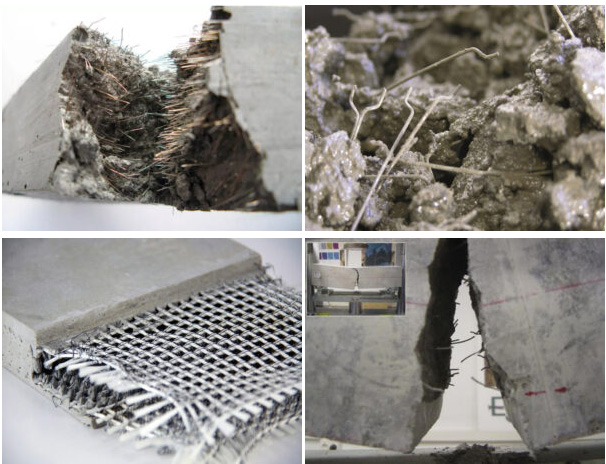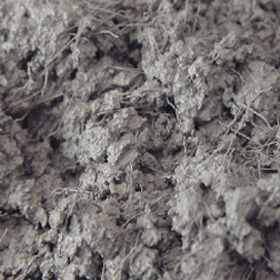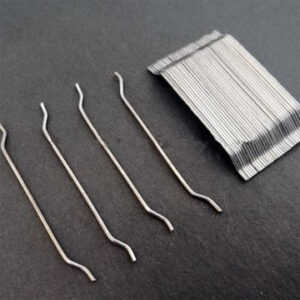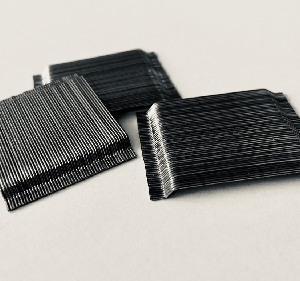Description
Concrete Reinforcing Fibers Product Technology
It has 10 improved production lines imported from Korea, which can produce steel fibers with a tensile strength of 1100-240 OMPA. According to customer needs, various special-shaped end hooks and special material steel fibers with special coatings can be customized, with an annual production capacity of 40,000 tons. Cooperate with the Building Materials Department of Hebei University of Technology to create a steel fiber innovation and application studio, dedicated to the innovation and development of steel fiber and the application research of steel fiber.
Steel Fiber Types
-
- Hooked End Steel Fibers: These fibers have a hooked end that improves their bonding to the concrete matrix, providing better tensile strength and crack control.
- Straight Steel Fibers: These fibers have a smooth surface and are commonly used in precast or shotcrete applications due to their high strength and ability to be easily mixed into the concrete.
- Deformed Steel Fibers: These fibers have a surface with deformations or indentations that provide better bonding to the concrete matrix, improving their tensile strength and crack control.
- Wavy Steel Fibers: These fibers have a wavy shape, which enhances their bonding to the concrete matrix and provides better crack control.
- Stainless Steel Fibers: These fibers are highly resistant to corrosion and are commonly used in environments with high exposure to chemicals or saltwater.
- Galvanized Steel Fibers: These fibers are coated with a layer of zinc, providing better corrosion resistance and durability in harsh environments.
- Micro Steel Fibers: These are small-diameter steel fibers that are commonly used in thin concrete sections or overlays, providing better crack control and improved durability.
-1024x267.jpg)
Hooked End Steel Fibers & Straight Steel Fibers & Deformed Steel Fibers

Wavy Steel Fibers & Stainless Steel Fibers & Galvanized Steel Fibers & Micro Steel Fibers
Steel fiber Performance
Steel fibers provide several performance benefits to concrete, making it stronger, more durable, and resistant to cracking and impact damage. Here are some of the ways steel fibers enhance the performance of concrete:
- Increased Tensile Strength: Steel fibers improve the tensile strength of concrete by providing additional reinforcement. This makes the concrete more resistant to cracking and increases its overall durability.
- Improved Flexural Strength: Steel fibers also enhance the flexural strength of concrete, making it more capable of supporting heavy loads and resisting bending forces.
- Crack Control: Steel fibers help to prevent cracking in concrete by providing additional reinforcement and improving the tensile strength of the material. This is particularly important in high-traffic areas or environments with heavy machinery.
- Impact Resistance: Steel fibers make concrete more resistant to impact damage, which is essential in areas where heavy machinery or vehicles are used or where there is a risk of impact damage.
- Improved Durability: Steel fibers increase the durability of concrete, making it more resistant to wear and tear and extending its service life.
- Enhanced Load-Bearing Capacity: Steel fibers also improve the load-bearing capacity of concrete, making it stronger and more capable of supporting heavy loads.
- Improved Fire Resistance: Steel fibers enhance the fire resistance of concrete by reducing the rate of heat transfer and preventing spalling.
Steel Fiber Reinforced Concrete Benefits
- Increased Durability: SFRC is more durable than traditional concrete due to the addition of steel fibers. This makes it more resistant to wear and tear, extending its service life.
- Improved Crack Control: The addition of steel fibers to the concrete mix helps to prevent cracking, improving the overall durability of the material.
- Enhanced Load-Bearing Capacity: SFRC has a higher load-bearing capacity than traditional concrete, making it suitable for use in structures that require high strength and durability.
- Impact Resistance: SFRC is more resistant to impact damage than traditional concrete, making it ideal for use in areas where heavy machinery or vehicles are used.
- Increased Fire Resistance: Steel fibers enhance the fire resistance of concrete by reducing the rate of heat transfer and preventing spalling.
- Reduced Maintenance Costs: The increased durability and crack control provided by SFRC results in reduced maintenance costs over the life of the structure.
- Faster Construction: SFRC can be poured and set more quickly than traditional concrete, reducing construction time and costs.
- Improved Aesthetics: SFRC can be colored and textured to match any design or architectural style, providing improved aesthetics and design flexibility.

other applications of steel fibers
Other Applications Of Our Steel Fibers
- Shotcrete: Steel fibers are commonly used in shotcrete applications to provide additional reinforcement and improve the strength and durability of the material. Shotcrete is a construction technique that involves spraying concrete onto a surface, and the addition of steel fibers enhances the bonding of the concrete and improves its overall performance.
- Refractory Materials: Steel fibers are also used in the production of refractory materials, which are used in high-temperature applications. The addition of steel fibers improves the mechanical properties of the refractory material, making it more durable and resistant to thermal shock.
- Asphalt Pavement: Steel fibers are sometimes added to asphalt pavement to improve its strength and durability. This is particularly important in areas with heavy traffic or where the pavement is exposed to extreme weather conditions.
- Composite Materials: Steel fibers are used as a reinforcement material in composite materials, which are used in various applications, including aerospace and automotive industries. The addition of steel fibers improves the strength and stiffness of the composite material, making it more resistant to damage and deformation.
- Soil Stabilization: Steel fibers are used in soil stabilization applications to improve the stability and load-bearing capacity of the soil. The fibers are mixed with the soil to create a reinforced soil structure that is more resistant to erosion and deformation.




-300x300.jpg)
Reviews
There are no reviews yet.